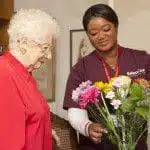A Simple Guide to Home Health Caregivers
Posted in A Simple Guide to Home Health Caregivers
The New York State Department of Health manages the training and licensing of a veritable alphabet soup of home caregiver disciplines, including HHA, PCA, and HA services, to name just a few.
Without insight into the meaning behind each of these designations, it’s common for new home care recipients to consider their service level based on billing rates, rather than finding a caregiver with the skills and training needed to make a difference in their lives. 
The following discusses the training each discipline of home caregiver receives, the work they can legally perform and the information you need to know to make an informed decision about who you hire to care for yourself or a loved one.
To make this explanation easier to digest, caregivers are organized based on the amount of training required for each position.
Companion/Housekeeper
Companions are hired through Companion Service Agencies, which are not licensed or regulated by NY State Department of Health.
Companion/Housekeeper is the most limited discipline of home care in New York. These caregivers cannot perform any type of hands-on care for their clients, like bathing, dressing or transfer assistance (helping a patient out of bed or into a chair). Instead, Companion/Housekeepers assist clients by managing their home, cooking meals, performing household chores, and escorting the client to appointments.
Personal Care Aide (PCA)/Home Attendant (HA)
Personal Care Aides fill a similar role to Home Health Aides (HHA), but perform a more limited set of home care tasks and undergo less training for certification, receiving 40 hours of classroom education compared to a Home Health Aide’s 75 hours of in-class and practical training. PCA services are available to patients considered “self-directing” (capable of making informed decisions about their own care.)
It should be noted that while the NYS DOH uses the term “Personal Care Aide” when referring to caregivers at this skill level, Medicaid refers to this group of caregivers as “Home Attendants.”
Both PCA’s and HHA’s hired through DOH-regulated agencies provide hands-on assistance to their clients, assisting them with activities of daily life like bathing, meal preparation and eating, ambulation and toileting. While PCA’s can perform these critical tasks, they cannot legally perform what the NYS DOH considers “simple medical procedures” like applying non-prescription ointments to a client’s skin or documenting a client’s vital signs.
Home Health Aide (HHA)
HHA’s receive a minimum of 59 hours of classroom education, as well as 16 hours of practical, hands-on training in a clinical setting like an assisted living facility.
Like a PCA, HHA’s perform a variety of daily living activities for their clients, however their extended training in classroom and practical settings means that they can perform simple medical tasks and work with clients who cannot direct their own care, are experiencing more complex medical conditions like late stage dementia or are receiving hospice care.
Due to this additional training, HHA’s can monitor and report vital signs to their client’s health care team, perform finger stick diabetes testing, care for minor wounds, perform range of motion exercises and in some cases assist with medical devices like oxygen concentrators.
An Important Note about Your Insurance
In order to receive the benefits of your Long Term Care insurance plan, your provider must receive day-to-day documentation of your home care services. Since PCA’s are not trained to perform medical documentation, the services of a Home Health Aide are required.
SelectCare employs HHA’s, rather than PCA’s for two important reasons: First, many of our clients rely on long term care insurance to cover the cost of their services. Second, HHA’s can perform a wider range of caregiving tasks including those of a PCA, meaning they can remain with a client as that client’s needs change. The shift from a familiar PCA to a new HHA just as a client’s needs begin to change can be a difficult transition. By beginning with HHA services, SelectCare seeks to promote a more consistent home care experience.
Private Caregivers
The final category of caregivers, Private Caregivers, is defined not by a uniform skill level, but rather by their method of employment.
Private caregivers are hired directly by a client or their family without the oversight of a licensed home care agency or the NYS DOH. These caregivers can perform any type of home care task they and their client are comfortable with, however it is up to both parties to set ground rules about what tasks will be performed.
While the lack of state oversight can create a more flexible home care arrangement, it should be noted that hiring a private caregiver “off the books” is a violation of state and federal labor laws. In order to use this service legally and avoid costly fines, clients are urged to hire a payroll accountant who can ensure you are in compliance with current labor and wage regulations.
No matter what type of home care service you might need, SelectCare is always available to answer your questions and help you make an informed choice about your home care experience.
